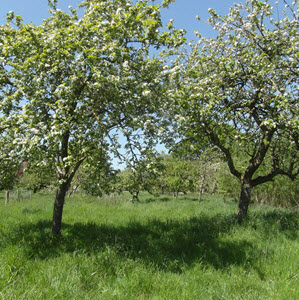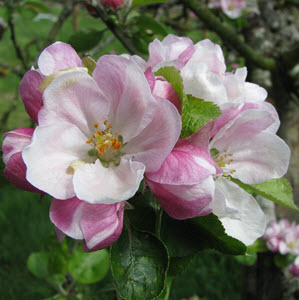People’s Trust for Endangered Species has launched the first ‘FruitFinder’ database as part of ongoing orchard conservation.
They say variety is the spice of life, but how many apple varieties have you tasted, and how many are there? You might be surprised to know, given that most supermarkets only stock about eight apple varieties, that there are actually thousands of native fruit varieties in the UK and FruitFinder, a new search tool from People’s Trust for Endangered Species (PTES) is here to help you discover them. Funded by the Esmée Fairbairn Foundation, this tool is part of an ongoing effort by PTES to conserve and restore traditional orchards across the country in recognition of their amazing habitat value to local wildlife.
There are around 5,000 fruit varieties grown in the UK, many of which are specific to the geographical area from which they come, such as the Carlisle Codlin or Severn Bank apples. FruitFinder is the first online database which lists every known UK grown variety of orchard fruit, from apples and pears to medlars and mulberries, providing a way for gardeners, cider-makers or orchard owners to find nurseries that sell them or a source of grafting material of rare heritage varieties. Increasing awareness of and access to these rare and heritage varieties will help prevent them being lost over time.


Over the last 10 years, PTES’ orchards team, with the help of over 700 volunteers and nearly 1500 orchard owners, has identified over 35,000 individual orchards in England and over 7,000 in Wales. Alarmingly, this work revealed that 90% of traditional orchards have been lost since the 1950s. Furthermore, 45% of the remaining orchards surveyed in England and 35% of orchards in Wales were found to be in declining condition as a habitat. By far the most common reason for this is lack of replacement tree replanting, meaning these remaining old orchards will quickly disappear unless action is taken.
FruitFinder tackles both of these issues head on by making it easier for the public to discover and buy traditional heritage trees to replant in their orchards, safeguarding these habitats, and varieties, for future generations.
Megan Gimber, Orchard Project Officer at PTES said: “PTES FruitFinder is a great way for people to find out more about local fruit and source local heritage trees and grafting material to grow their own fruit trees. The more we can educate the public about the need for conserving traditional orchards, the more likely we are to be successful in reversing their decline.”
To help halt the decline in traditional orchards, over the last year a PTES orchard grant scheme has sent out trees and enough grafting kits to plant over 1,500 trees in traditional orchards across the UK. PTES has created several online practical guides covering various aspects of orchard management, such as pruning and grafting new trees, to encourage orchard owners to manage their orchards in a sustainable and wildlife-friendly manner.
Traditional orchards are fantastic for wildlife as they are made up of several different habitats, including elements of woodland, hedgerow and meadow grassland. This mosaic of habitats is home to a range of biodiversity, including butterflies, bumblebees, birds, bats and beetles. The unique way fruit trees age creates an indispensable habitat for a wide range of rare and interesting species.
Megan concludes: “Traditional orchards offer the habitat stability that is becoming so scarce in our countryside, yet is so valuable to the future of our wildlife”.
For more information or to access PTES’ FruitFinder, please visit the PTES website
